
Poetry, also called verse, is a form of literature that uses aesthetic and often rhythmic qualities of language − such as phonaesthetics, sound symbolism, and metre − to evoke meanings in addition to, or in place of, a prosaic ostensible meaning. A poem is a literary composition, written by a poet, using this principle.

Rae Armantrout is an American poet generally associated with the Language poets. She has published more than two dozen books, including poetry and prose.

The ghazal is a form of amatory poem or ode, originating in Arabic poetry. Ghazals often deal with topics of spiritual and romantic love and may be understood as a poetic expression of both the pain of loss or separation from the beloved and the beauty of love in spite of that pain.
Alamgir Hashmi, also known as Aurangzeb Alamgir Hashmi, is an English poet of Pakistani origin. Considered avant-garde, his early and later works were published to considerable critical acclaim and popularity.

Urdu poetry is a tradition of poetry and has many different forms. Today, it is an important part of the culture of India and Pakistan. According to Naseer Turabi there are five major poets of Urdu: Mir Taqi Mir (d.1810), Mirza Ghalib, Mir Anees (d.1874), Muhammad Iqbal and Josh Malihabadi (d.1982). The language of Urdu reached its pinnacle under the British Raj, and it received official status. All famous writers of Urdu language including Ghalib and Iqbal were given British scholarships. Following the Partition of India in 1947, it found major poets and scholars were divided along the nationalistic lines. However, Urdu poetry is cherished in both the nations. Both the Muslims and Hindus from across the border continue the tradition.

Faiz Ahmad Faiz was a Pakistani poet and author of Punjabi and Urdu literature. Faiz was one of the most celebrated, popular, and influential Urdu writers of his time, and his works and ideas remain widely influential today in Pakistan and beyond. Outside of literature, he has been described as "a man of wide experience", having worked as a teacher, military officer, journalist, trade unionist, and broadcaster.

Rakhshandeh E'tesami, better known as Parvin E'tesami, was an Iranian 20th-century Persian poet.
The qaṣīda is an ancient Arabic word and form of poetry, often translated as ode, passed to other cultures after the Arab Muslim expansion.

Syed Ahmad Shah, better known by his pen name Ahmed Faraz, was a Pakistani Urdu poet, scriptwriter and became the founding Director General of Pakistan Academy of Letters. He wrote his poetry under the pseudonym Faraz. He criticised military rule and coup d'état in the country and was displaced by the military dictators.
Islamic poetry is a form of spoken word written & recited by Muslims. Islamic poetry, and notably Sufi poetry, has been written in many languages including Urdu and Turkish.
Amir Hamza Khan Shinwari, commonly known as Hamza Baba was a prominent Pashto and Urdu language poet, playwright and author. His works are studied at Master-level at the University of Peshawar. He is considered a bridge between classic Pashto literature and modern forms. He founded the Khyber School in Pashto literature. A number of notable poets of this school, such as Nazir Shinwari, Khatir Afridi, and Khyber Afridi were his pupils.
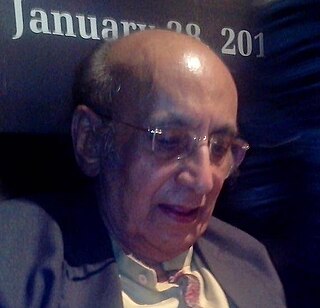
Muqtida Hasan Nida Fazli, known as Nida Fazli, was a prominent Indian Hindi and Urdu poet, lyricist and dialogue writer. He was awarded the Padma Shri in 2013 by the government of India for his contribution to literature.
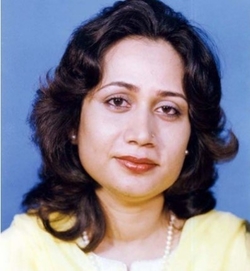
Parveen Shakir was a Pakistani poet, teacher and a civil servant of the government of Pakistan. She is best known for her poems, which brought a distinctive feminine voice to Urdu literature.

Annie Finch is an American poet, critic, editor, translator, playwright, and performer and the editor of the first major anthology of literature about abortion. Her poetry is known for its often incantatory use of rhythm, meter, and poetic form and for its themes of feminism, witchcraft, goddesses, and earth-based spirituality. Her books include The Poetry Witch Little Book of Spells, Spells: New and Selected Poems, The Body of Poetry: Essays on Women, Form, and the Poetic Self, A Poet's Craft, Calendars, and Among the Goddesses.
A marsiya is an elegiac poem written to commemorate the martyrdom and valour of Hussain ibn Ali and his comrades of the Karbala. Marsiyas are essentially religious.
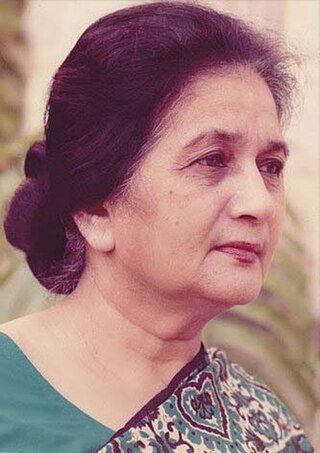
Ada Jafarey, often spelled Ada Jafri, was a Pakistani poet who is regarded as the first major female Urdu poet to be published and has been called "The First Lady of Urdu Poetry". She was also an author and was considered a prominent figure in contemporary Urdu literature. She received awards from the Government of Pakistan, the Pakistan Writers' Guild, and literary societies of North America and Europe in recognition of her efforts.
Danielle Pafunda is an American writer and poet. She has taught for the University of Wyoming, University of California San Diego, and is 2018-19 Visiting Assistant Professor of Poetry and Poetics at the University of Maine. She also teaches for Mississippi University for Women's low-residency MFA. She often lives and works in the Mojave Desert.
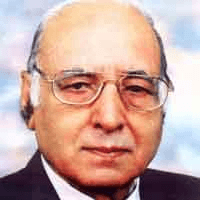
Mohammad Ibrahim Baig, known by his pen name Khatir Ghaznavi; romanized: K̲h̲āt̤ir G̲h̲aznavī, was a Pakistani multilingual writer, poet, playwright, research scholar, and director of Pakistan Academy of Letters. He wrote about forty-five to fifty books, including poems and children's books in Urdu, Hindko and Pashto languages throughout his life, though most of his literary work appears published in Urdu and Hindko.
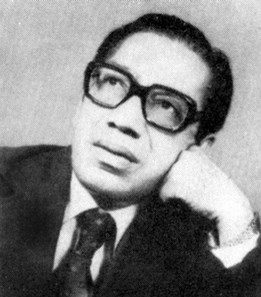
Ahmad Shah, known by his pen name as Farigh Bukhari, was a Pakistani multilingual poet and progressive writer. He wrote books, including poetry on various subjects such as literature, social issues and politics in Hindko, Pashto and predominantly in Urdu language. Some of his publications appears about universal values and humanism.

Vasdev Mohi is a Sindhi poet, translator, critic, short story writer and a retired lecturer. He also served as the member of the executive board of Sahitya Akademi and member of Council for Promotion of Indian Languages, collectively from 2008 to 2013. His work include twenty-five books of poetry, uncertain translation and critic works. The recipient of numerous awards, including Saraswati Samman for his short story book titled Chequebook published in 2012, some of his uncertain critical essays have appeared in literary festivals held in national and international seminars.













